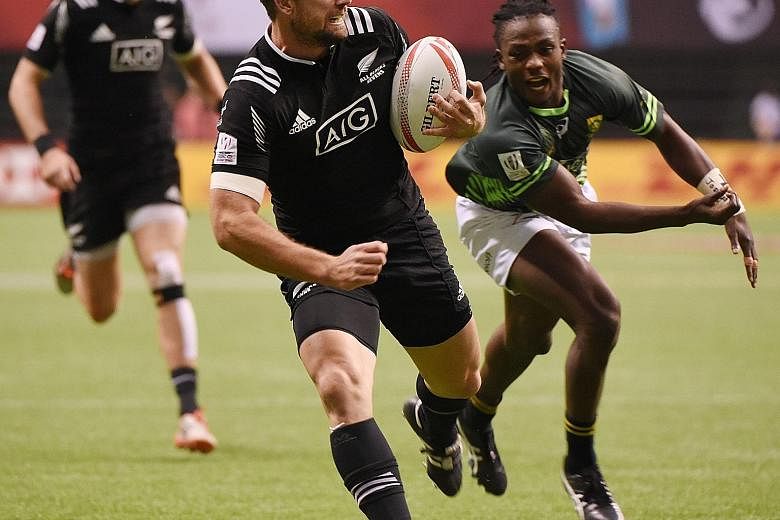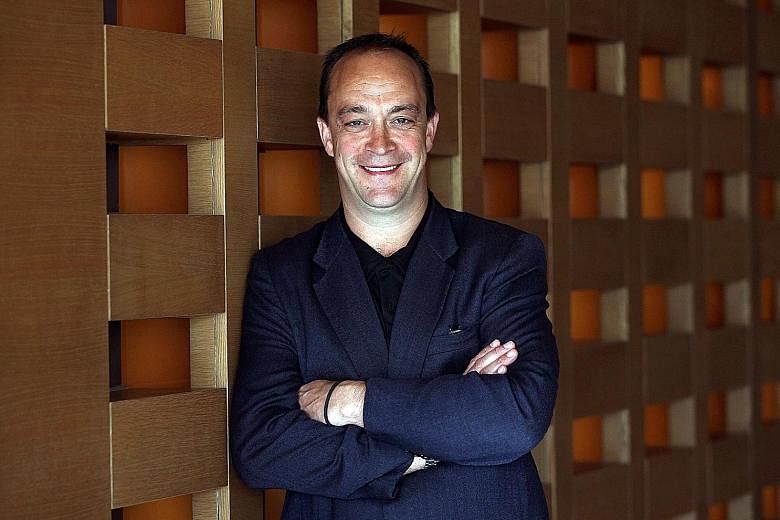For almost a decade, it has been a brand associated with women's golf in Singapore but next week, the familiar red and white of HSBC will be synonymous for bone-crunching tackles instead of birdies as the Singapore Sevens returns after a 10-year absence.
While Barclays and Sony Ericsson have ended their major title sponsorship deals in football and tennis, HSBC has strengthened its backing of golf and rugby with its global head of sponsorship and events Giles Morgan pivotal to that direction.
Both sports will make a comeback at the Olympic Games later this year and particularly for rugby sevens, inclusion at the Summer Games in Rio is a potential game changer, the 46-year-old told The Straits Times last month on the sidelines of the HSBC Women's Champions in Sentosa Golf Club.
While 15-a-side rugby union - with its World Cup, Six Nations and British & Irish Lions quadrennial tour - remains the heartbeat of the sport in established European and Southern Hemisphere markets, the game's shortened version is faster, flashier and perfectly suited to the tastes of the 21st century sports fan.
About 7.2 million people currently play rugby and global participation rates are set to double to 15 million by 2026, with most picking up the sport through sevens, noted a report published yesterday by HSBC and strategic planning agency The Futures Company. The report is supported by the sport's governing body World Rugby.
Last year, World Rugby stated that 46,000 kids in Brazil - which will host Olympics this August - have already been introduced to sevens.
Former England coach and 2003 World Cup winner Clive Woodward called sevens the "sleeping giant" of rugby. He added: "Sevens attracts a different crowd from 15s. It may overtake 15s if you think about the number of people playing and its popularity."
The format of sevens, which favours individual skill and speed, allows non-traditional rugby nations to be more competitive - this season's HSBC World Rugby Sevens Series has seen minnows Kenya and the United States record wins over 12-time champions New Zealand.
Its easy-to-understand rules and end-to-end action in bite-sized seven-minute halves also makes it attractive to younger audiences in previously untapped markets like China and Brazil, observed Morgan.
Each season of the World Series draws more than half-a-million fans to the stadiums and the 2014-15 campaign saw a record 5,884 broadcast hours reach 400 million households globally.
New first-time host cities in Sydney, Cape Town and Vancouver this term further illustrate the widening appeal of sevens while World Rugby is considering expanding the 10-stop World Series to 12.
The Singapore leg will be held next weekend at the National Stadium and organisers are confident of reaching their target of 26,500 tickets a day for the April 16-17 event.
Football may be the world's undisputed No. 1 sport but rugby is making great strides. The average attendance at the 2014 World Cup in Brazil was 53,592 football fans over 64 matches, only slightly higher than the 2015 Rugby World Cup, which averaged 51,621 over 48 games in England and Wales.
EY - the accounting giant formerly known as Ernst & Young - estimated that the tournament generated a domestic output of £2.2 billion (S$4.3 billion).
Investment back into the game has also reached record levels. Since 2009, World Rugby has spent £350 million in game development, high performance, competitions and player welfare strategies across 120 national unions.
Despite the economic downturn which last year saw it announce plans to shed up to 50,000 jobs worldwide as part of cost-cutting measures, HSBC - with 2015 profit before tax of US$18.9 billion (S$25.9 billion) - remains supportive of its sponsorship portfolio in sports, said Morgan.
Besides the men's and women's World Rugby Sevens Series and the Australian Rugby Union, Europe's largest bank are heavily involved in golf and are title sponsors of top-tier events in Shanghai, Abu Dhabi and Singapore, as well as the official patron of the British Open.
Morgan added: "In marketing terms it is better to focus on one or two associations and do it really well... what we focus on is international sports that have very powerful and strong values, which rugby and golf have, that are of interest to our target markets in countries where we want to do business."
The recent scandals involving Fifa (corruption), the International Association of Athletics Federations (doping) and International Tennis Federation (match-fixing) were troubling and a "good wake- up call for the industries to get their houses in order" but are unlikely to dissuade sponsors in the long-term.
Live sports, stressed Morgan, still allow brands an effective platform in the social media landscape to engage their customers.
Last year's Rugby World Cup, backed by 10 worldwide partners including Coca-Cola, Heineken, Land Rover and Toshiba, was commercially the most successful staging and augurs well for the 2019 edition in Japan, which will be the first in Asia.
Not only is rugby is shifting away from the traditional 15s to the modern sevens version, the face of the sport is also changing.
World Rugby estimates that the number of female players has increased from 200,000 to 1.7 million in the last three years. Said Morgan: "It's creating more opportunities for young girls to play sports and that is truly something special."
•The Business of Sport is a monthly series looking at the movers and shakers of Singapore's emerging sports business industry



